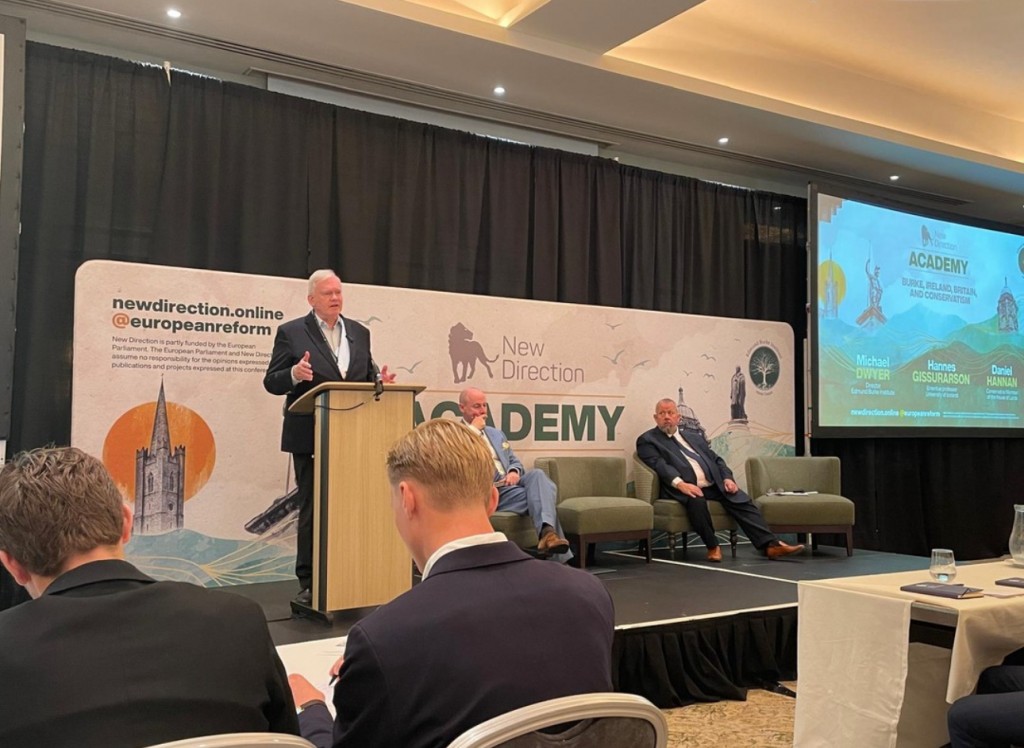 RNH Academic Director Hannes H. Gissurarson, Professor Emeritus of Politics at the University of Iceland, was invited to give a talk at a meeting of the Brussels think tank New Direction in Dublin on 17 September 2024. He used the opportunity to compare the ideas of local thinker Edmund Burke to those of three Nordic thinkers, Snorri Sturluson, Anders Chydenius, and N. F. S. Grundtvig. Snorri had in his Heimskringla presented two political principles, government by consent and the right of rebellion. These principles had later been articulated and elaborated by three British writers, John Locke, David Hume, and Adam Smith, who could be regarded as the fathers of classical liberalism, whereas Snorri was a proto-liberal. As a result of the 1789 French Revolution, classical liberalism had split into the radical liberalism of Tom Paine (and later John Stuart Mill) and the conservative liberalism of Edmund Burke (and later Alexis de Tocqueville).
RNH Academic Director Hannes H. Gissurarson, Professor Emeritus of Politics at the University of Iceland, was invited to give a talk at a meeting of the Brussels think tank New Direction in Dublin on 17 September 2024. He used the opportunity to compare the ideas of local thinker Edmund Burke to those of three Nordic thinkers, Snorri Sturluson, Anders Chydenius, and N. F. S. Grundtvig. Snorri had in his Heimskringla presented two political principles, government by consent and the right of rebellion. These principles had later been articulated and elaborated by three British writers, John Locke, David Hume, and Adam Smith, who could be regarded as the fathers of classical liberalism, whereas Snorri was a proto-liberal. As a result of the 1789 French Revolution, classical liberalism had split into the radical liberalism of Tom Paine (and later John Stuart Mill) and the conservative liberalism of Edmund Burke (and later Alexis de Tocqueville).
Gissurarson said that the two most influential Nordic liberals of the eighteenth and nineteenth century, the Swedish pastor and politician Anders Chydenius and the Danish pastor and poet N. F. S. Grundtvig, had both been conservative liberals, preferring evolution to revolution, opposing the French Jacobins, but strongly supporting freedom of expression and of religion, private property and economic freedom. Grundtvig had translated Snorri’s Heimskringla into Danish and in his own writings emphasised the Nordic cultural heritage. It was interesting, Gissurarson added, to compare Ireland and Denmark in the nineteenth century because geographical conditions and natural resources were similar in the two of them. One reason why the Danes were more successful than the Irish was that they were a sovereign nation enjoying social cohesion, not least because of Grundtvig’s effort in education. Grundtvig was still relevant, not least his national non-aggressive liberalism. Other speakers at the meeting included an old friend of Iceland, Lord Daniel Hannan of Kingsclere.


